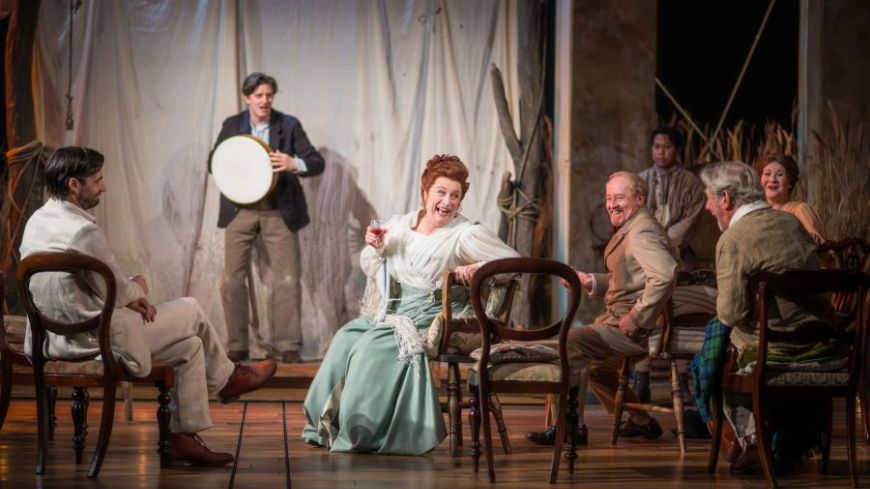
The Royal Lyceum’s incoming artistic director James Brining opens his tenure with an ambitious and reverent staging of Chekhov’s quietly devastating The Seagull, adapted by Mike Poulton. It is a fittingly meta beginning: a play about plays and the delusions of artistic ambition. In other words, a story in which almost nothing happens and yet everything hurts.
Poulton’s writing and Brining’s direction lean into a play of profound contradictions: hilarious in its despair, dramatic in its anti-drama, and deeply emotional even though most characters are incapable of expressing their feelings directly. This production leans into those contradictions with both care and boldness to deliver a moving yet funny show with just the right amount of self-awareness.
Brining’s direction shines in the quieter moments, through silences that stretch a little too long, awkward interactions and the way unspoken feelings hang in the air like the scent of something rotten. These human beats are carefully drawn out, letting the absurdity of tragic people leading unremarkable lives speak for itself.
The underlying rot is echoed in Colin Richmond’s set, assisted by Anna Kelsey, which evokes a faded grandeur with browned wood and dusty opulence, creating a country house that feels expansive yet increasingly claustrophobic. It’s beautiful and bleak, framed with the rawness of its themes.
The big pull of this production is Caroline Quentin as Arkadina, the monstrous and magnetic matriarch whose need for validation borders on pathological but with undeniable charisma. Quentin doesn’t disappoint and doesn't just play Arkadina; she performs her in a layered echo of the character’s own compulsive theatricality in a star turn that’s still generously played with space for others to also shine in a pleasing ensemble.
Lorn Macdonald as her son Konstantin brings a simmering frustration to the would-be revolutionary playwright, a young man desperate to be noticed and destined not to be. His descent into disillusionment is both painful and wryly comic, particularly as his radical posturing starts to resemble the very traditions he seeks to destroy. Harmony Rose-Bremner’s Nina feels fragile but not hollow, and her final, fractured confrontation with Konstantin is delivered delicately.
John Bett ensures likeability with his wistful and worn-down Sorin, drifting through the action like a genteel ghost full of good intentions, failed ambitions, and the quiet ache of a life half-lived. Tallulah Greive’s Masha is a darkly delightful snuff-taking figure of doom whose deadpan delivery teeters between comedy and tragedy.
Dyfan Dwyfor navigates the fine line between Trigorin’s self-serving vanity and passive, predatory charm with understated precision. Irene Allan’s long-suffering Polina is worn thin by years of quiet disappointment, swithering between clinging to dignity and Forbes Masson’s affably corrosive Dr Dorn with equal desperation.
Michael Dylan is haplessly sincere as Medvedenko, whose tireless concern and schoolteacher logic fails to win him either love or respect, juxtaposing with Steven McNicoll’s blustering Shamrayev whilst Kristian Lustre’s ever-present servant Yakov says little but speaks volumes, observing along with us.
Unrequited longing for many romantic misalignments gives the play its undercurrent of emotional futility in a showcase of people wanting things they can’t have, speaking but never connecting, performing but never being seen. The result is not a reinvention, but a thoughtful, emotionally intelligent revival that lingers in a quietly absurd evening of theatre where nothing happens and everything matters, reinforcing the play’s central truth that tragedy doesn’t arrive with fanfare but seeps in, unnoticed.
The Seagull is at the Royal Lyceum Theatre until Saturday 1 November.
Tickets here.
© Lindsay Corr, October 2025.

